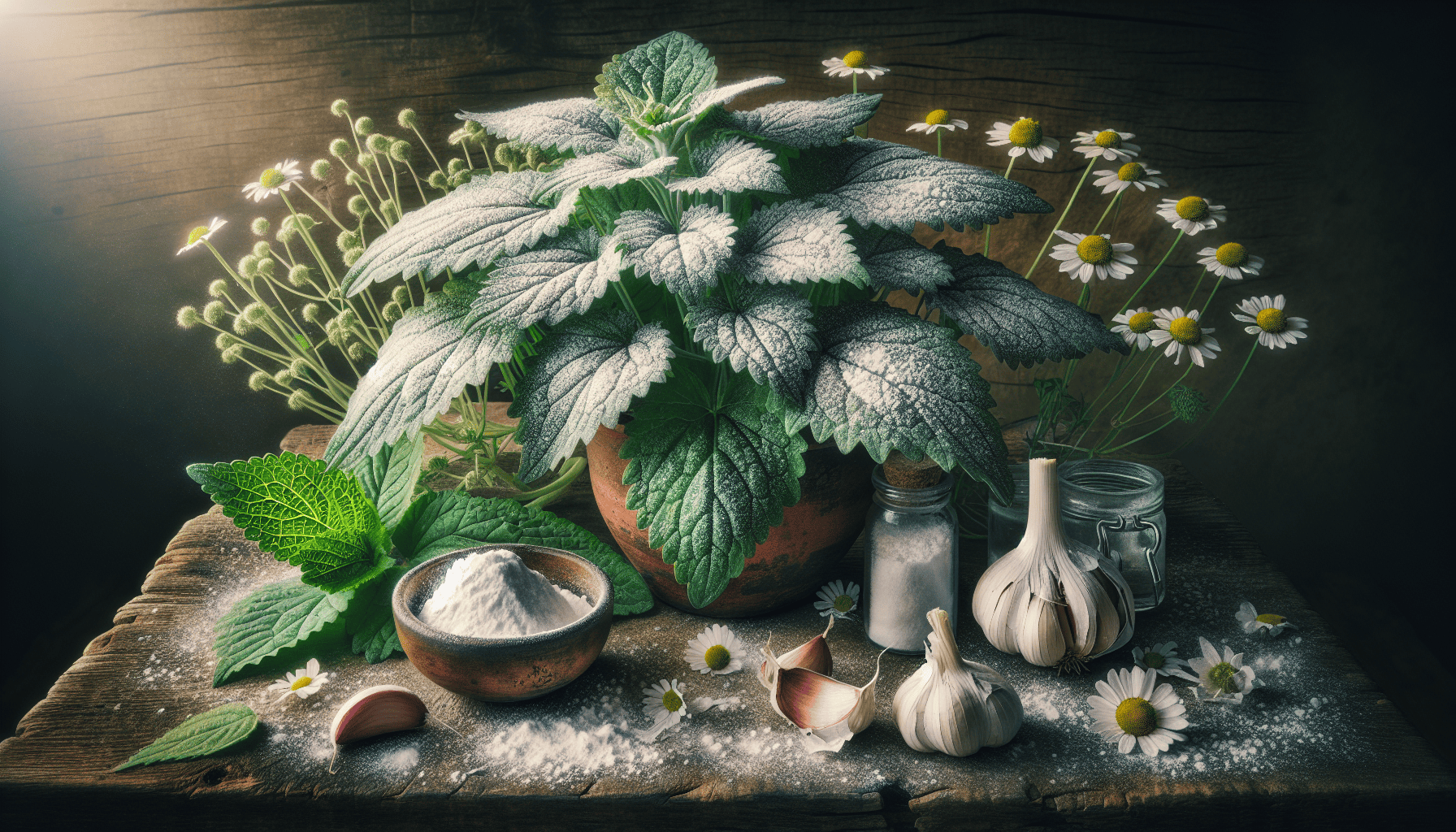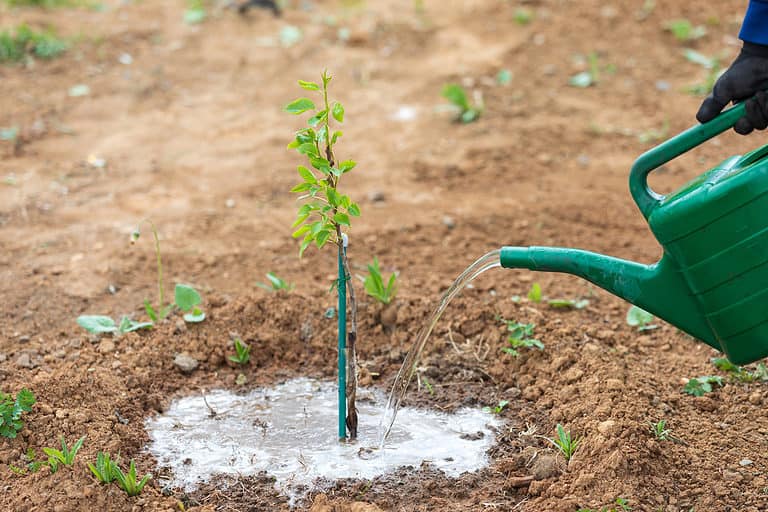Top Home Remedies for Garden Diseases: Effective and Easy Solutions

Looking for effective home remedies for garden diseases? This article offers simple solutions to prevent and treat common garden issues with items you likely have at home. Learn how to use natural ingredients to keep your garden healthy and vibrant.
Key Takeaways
Preventing garden diseases starts with healthy soil, proper watering, and adequate plant spacing to create a resilient environment.
Natural remedies like baking soda, chamomile tea, and garlic sprays effectively combat common fungal diseases without chemicals.
Using organic pest control methods, such as beneficial insects and diatomaceous earth, maintains a balanced garden ecosystem while managing pests.
Preventing Garden Diseases

To ward off diseases in your garden, the most effective strategy is to stop them from establishing themselves initially. Starting with fertile, well-tended soil, implementing correct watering habits, and ensuring plants have enough space between them, lays the groundwork for a robust garden where plants can flourish and fend off disease and pests.
Now let’s delve deeper into these preventative strategies.
Healthy soil practices
A flourishing garden is rooted in the quality of its soil. By adding well-aged compost, worm castings, and finely chopped leaves to your garden beds, you can dramatically boost the health of your soil. These organic additions work wonders by improving soil texture, fostering better nutrient retention and sustaining beneficial insects along with microorganisms that help shield plants from diseases. This rich concentration of organic matter fortifies plant health against disease invasion while enhancing overall garden vigor.
Spreading seaweed as mulch not only preserves moisture levels within the soil, but also serves as a deterrent for slug infestations and strengthens plant hardiness. Employing techniques such as natural composting methods or applying top dressings like compost or organic fertilizers are key strategies in building robust organically-rich soils.
To prevent unwittingly introducing harmful pests or diseases into your ecosystem via amendments purchased elsewhere, it’s crucial to procure these materials from reputable suppliers. When carefully managed this way, healthy enriched soils play an integral role in effective pest management by nurturing robust plants which inherently withstand pest invasions more effectively.
Proper watering techniques
Ensuring appropriate watering of your garden is essential for staving off diseases associated with dampness. Watering early in the morning is optimal as it enables the foliage to dry out rapidly, thereby diminishing the likelihood of fungal infections taking hold. Timely irrigation plays a pivotal role in safeguarding against various ailments, particularly those caused by fungi.
Focusing on delivering water directly to the root zone while keeping foliage dry is critical for plant health and vigor. This approach holds particular significance for indoor plants and potted plants, where effectively regulating moisture levels can pose additional difficulties.
Plant spacing and air circulation
Maintaining sufficient space between plants is essential for a thriving, healthy garden. When there’s ample room for airflow, the humidity around the vegetation decreases significantly, thereby cutting down on the possibility of fungal infections taking hold. Enhanced air movement hinders disease transmission by creating an environment that is less conducive to pathogen survival.
Providing your plants with adequate spacing not only fosters robust growth, but also serves as a defense against potential diseases. This principle applies equally to ornamental garden beds and productive vegetable gardens, guaranteeing optimal growing conditions that allow your plant life to prosper.
Natural Remedies for Common Fungal Diseases

Natural remedies can serve as potent and harmless methods for tackling fungal diseases, such as powdery mildew, that might otherwise devastate your garden. These homemade treatments provide a way to address these issues without damaging your plants or negatively impacting the ecosystem.
You can concoct three strong natural fungicides in your own kitchen: a solution made from baking soda, a spray derived from chamomile tea, and another spray prepared with garlic. Each of these has proven to be effective against plant fungal infections while remaining environmentally friendly.
Baking soda solution
Mixing a solution of baking soda has been proven effective against fungal afflictions such as black spot and powdery mildew. Create this natural fungicide by blending 2 teaspoons of baking soda, 1/2 teaspoon of liquid soap, and mixing them into 2 quarts of water. Repeated applications to the impacted regions every several days should continue until the issue resolves.
To boost its potency, you might include cooking oil and Ivory soap in your concoction. This enhanced mixture can safeguard your roses along with various other flora for an extended period spanning multiple months, ensuring that your garden remains robust and flourishing.
Chamomile tea spray
Not only is chamomile tea a calming drink, it possesses antibacterial and fungicidal qualities beneficial for addressing fungal infections in vegetation.
To create this remedy, steep 16 tea bags or measure out 2 cups of dried chamomile flowers into 2 quarts of water. Simmer the mixture for a duration of 20 minutes. The resulting infusion can be utilized to water seedlings from beneath or as a leaf spray, offering an organic protective barrier against fungal diseases.
Utilizing this approach proves particularly effective in averting the onset of damping off among young plants, promoting their robust and vigorous development.
Garlic fungicide spray
Garlic boasts powerful natural fungicidal properties that are effective against a myriad of fungal diseases in your garden. To create a garlic-based fungicide spray, blend 2 cloves of garlic into a puree, combine with a quart of water, filter the mixture and then incorporate 1/8 teaspoon of liquid soap.
Prior to application on your plants, dilute the mixture using one part garlic solution to ten parts water. This diluted mix is potent in safeguarding your plants from prevalent fungi such as powdery mildew, promoting plant health while eliminating the dependence on chemical solutions.
Homemade Insecticidal Sprays for Soft-Bodied Insects

Aphids and spider mites, which are soft-bodied insects, can wreak havoc on your garden. Natural insecticidal sprays made at home provide a reliable method for managing these pests. Utilizing basic components like soap, vegetable oil, and neem oil, one can concoct strong yet environmentally friendly insecticides that safeguard both plants and their surroundings.
We will delve into three potent formulas for crafting homemade insecticidal sprays that offer effective pest control solutions.
Basic soap spray insecticide
An effective method to manage soft-bodied insect pests such as aphids, spider mites, and whiteflies is the use of a simple soap spray insecticide. To prepare this concoction, blend 1.5 teaspoons of dish soap with a quart of water.
To protect beneficial insects and ensure peak potency against unwanted pests, it’s best to administer the soap spray either in the early morning or during evening hours. This straightforward approach provides gardeners with an environmentally friendly alternative for maintaining pest-free plants without relying on severe chemical treatments.
Vegetable oil mixed with soap
To concoct an effective basic oil spray insecticide, blend a tablespoon of canola oil with a quart of water and add in just a few drops of mild soap. This mixture is adept at stifling pests such as aphids, beetles, and mites on contact when sprayed generously over the plants that have been affected. The vegetable oil’s mechanism suffocates the insects, thereby neutralizing them.
For optimal outcomes, reapplication should occur every four to seven days or following substantial rainfall events to maintain efficacy against these nuisances.
Neem oil acts as an insecticide
Derived from the neem tree, neem oil serves as an effective natural insecticide adept at managing a myriad of garden pests such as aphids, beetles, and whiteflies. To maintain control over these unwanted visitors, it is recommended to apply the oil once during dormant periods and subsequently on a weekly or biweekly basis throughout the growing season.
To both ensure the wellbeing of your plants and enhance the potency of neem oil’s pest-fighting properties, adhere closely to prescribed application procedures. Utilizing this organic solution not only keeps pests in check, but also fosters a more vibrant garden ecosystem.
DIY Treatments for Bacterial and Viral Plant Diseases
Home remedies can provide powerful solutions for combating bacterial and viral diseases that threaten to wreak havoc on your garden. Employing everyday items found around the house, these treatments help control infections while enhancing the immune response of plants.
We will explore three potent home concoctions: a solution made with aspirin, a spray derived from milk, and a mixture using hydrogen peroxide.
Aspirin solution
Mixing a water solution with dissolved aspirin can bolster the defense system of plants, thereby heightening their resilience to diseases such as black spot, rust, and powdery mildew. By dissolving an aspirin tablet into one gallon of water and spritzing it onto your flora, this concoction activates the inherent protective responses within plants against infections.
Applying this mixture on a routine basis can maintain the well-being of your garden and protect it from various fungal afflictions.
Milk spray
A mixture of milk diluted with water has been found to be an unexpectedly efficient remedy for viral infections in plants. When this solution is administered to your plants, it can both help fight off these infections and enhance the immune system of the plant.
For effective use, blend together one portion of milk with two portions of water. This mixture should then be applied consistently to any affected plants. Not only does this natural treatment combat viruses, but it also supplies vital nutrients that contribute to fortifying your plants’ health.
Hydrogen peroxide solution
Hydrogen peroxide serves as a potent natural germicide, possessing the ability to eradicate pathogens upon contact. Create a mixture by combining one measure of hydrogen peroxide with four measures of water, and apply this solution to your plants and soil by spraying.
Using this method not only helps in exterminating pathogens, but also supports robust plant growth through sterilization of both plant surfaces and the adjacent soil. Consistent use can maintain your garden’s resistance against bacterial and viral infections.
Organic Pest Control Methods

Organic methods of pest control are critical for preserving a harmonious garden ecosystem. These techniques prioritize nature’s own mechanisms and employ the least harmful approaches, ensuring that pests are controlled without damaging your plants or the environment.
Three key organic strategies for managing pests include promoting beneficial insects, utilizing diatomaceous earth, and implementing companion planting.
Beneficial insects
In maintaining a healthy garden ecosystem, beneficial insects are indispensable as they actively regulate populations of harmful insects. By feeding on pests and their young, such as aphids, mites, and whiteflies, predators like ladybugs, lacewings, and praying mantises play an essential role in pest control.
To lure these valuable allies to your garden or sustain them thereon, you can either enhance plant variety within your space or source them via online catalogs. Deploying beneficial insects into your garden at least once per growing season can profoundly curtail the number of unwanted pests and bolster a balanced ecological system for your plants.
Diatomaceous earth
Made from fossilized remains of diatoms, diatomaceous earth acts as a natural insecticide. It lethally dehydrates insects by inflicting physical damage to their exoskeletons. This makes it useful against nuisances such as ants, slugs, and snails.
To employ this substance in pest control, you can either dust it over the soil surrounding your plants or lightly apply it directly onto plant leaves. As a secure and eco-friendly solution, diatomaceous earth manages pests while preserving beneficial insects and not causing environmental harm.
Companion planting
Choosing plant companions that provide mutual benefits and deter pests is the essence of companion planting. It strengthens the garden’s defense, reducing the likelihood of pest infestation. For instance, placing marigolds near tomato plants can fend off nematodes. Similarly, incorporating basil into your garden can keep flies and mosquitoes at bay.
Implementing an annual crop rotation disrupts the cycle of pest reinfestation, contributing to a more vibrant and fruitful garden environment.
Home Remedies for Specific Garden Pests

To maintain control over specific pests in the garden, it’s essential to use remedies tailored for each type. Utilizing natural substances and methods can successfully regulate invaders such as spider mites, Japanese beetles, snails, and slugs while avoiding toxic chemicals.
Now let’s delve into some home solutions that are potent against these widespread insect pests found in gardens.
Japanese beetles
A natural remedy involving a blend of red pepper powder, water, or liquid soap can serve as an effective deterrent against Japanese beetles. The incorporation of specific plants such as garlic and chives, along with leaves from larkspur plants, may also repel these troublesome insects.
For physical removal strategies to capture and dispose of the beetles, handheld vacuums and buckets filled with soapy water prove useful. The application of milky spores into the soil offers a prolonged solution for beetle control that can last up to a decade.
Slugs and snails
To effectively manage slugs and snails, utilizing bait methods such as beer traps proves to be highly effective. Set out containers filled with beer in your garden at nightfall. The allure of the beer will draw these pests in, causing them to tumble into the trap.
Alternatively, creating deterrent barriers using materials like copper strips, pine needles, coffee grounds, crushed eggshells or diatomaceous earth can help fend off these invaders. These strategies offer a natural and secure means of safeguarding your flora from such ubiquitous garden nuisances.
Spider mites
Spider mites are detrimental to plant health, as they feed on sap and result in leaves turning yellow and limited plant growth. Controlling the infestation can be achieved by keeping temperatures under 80°F and elevating moisture levels.
Utilizing advantageous insects such as Feltiella acarisuga is another method for suppressing spider mite numbers. Implementing a combination of environmental management with natural predators offers a robust approach to safeguard your plants from spider mites.
Tips for Effective Application of Home Remedies
It’s vital to administer home treatments accurately in order to guarantee they work as intended and avoid causing harm to your plants. Key recommendations consist of evaluating the mixtures, applying them at appropriate times, and wearing safety equipment so that you can optimize the advantages of your DIY pest control solutions.
Testing solutions
Before applying a homemade pesticide solution across your entire plant, it’s important to first try it out on a small section. Apply the concoction to just a few leaves and monitor for any harmful effects over the course of 24 hours.
Should there be any indications of harm to the plant, consider altering the strength of your mixture and conducting another test. Taking this step is crucial in making sure that your self-made treatments do no damage to your plants.
Proper timing
Applying treatments at optimal times is essential for their success. Early mornings or late evenings, when temperatures are cooler, represent ideal periods to administer remedies. This approach reduces stress on plants and maximizes treatment benefits.
To circumvent potential harm to plants and a decline in solution performance, it is advisable not to apply treatments during midday heat.
Protective gear
It is crucial to wear protective equipment, such as gloves and a mask, when dealing with strong DIY pesticides. This step safeguards you from coming into contact with the hazardous components. Abstain from using these homemade solutions on days when the wind might carry them inadvertently to yourself or those around you.
Adhering to these safety measures will enable you to use your homemade garden treatments both effectively and without risk.
Summary
To keep a healthy garden flourishing, it’s essential to employ natural and effective measures for pest control. By enhancing the soil health with good practices and ensuring proper irrigation, you prevent plant diseases. Utilizing organic fungicides along with homemade sprays designed to repel insects safeguards both your plants and the ecosystem. Tackling common garden pests through these environmentally friendly strategies helps avoid reliance on potent chemicals. Adopt these organic approaches, allowing your garden to thrive beautifully!
Frequently Asked Questions
How often should I apply the baking soda solution to my plants?
To treat the problem efficiently, it is advised to administer the solution of baking soda repeatedly, at intervals of a few days, until the fungal condition has been fully remedied.
Can I use chamomile tea spray on all types of plants?
Chamomile tea spray can be used on many plants, especially to treat fungal infections, and is particularly beneficial for seedlings.
However, always test on a small area first to ensure compatibility with your specific plants.
What are the best times to apply homemade insecticidal sprays?
The optimal times to apply homemade insecticidal sprays are early in the morning or late in the evening, as these moments minimize plant stress and enhance effectiveness.
How do I attract beneficial insects to my garden?
Incorporate a wide array of flowering plants to boost plant diversity in your garden, which will draw in advantageous insects such as ladybugs and lacewings.
Establishing this diverse habitat fosters a robust ecosystem that effectively manages pests through natural means.
What precautions should I take when applying homemade pesticides?
It is essential to wear gloves and a mask when using homemade pesticides, as personal protection is key. One should steer clear of applying these substances on blustery days to minimize the risk of accidental exposure.
Taking these precautions not only safeguards your well-being, but also guarantees that pest control measures are implemented efficiently.




